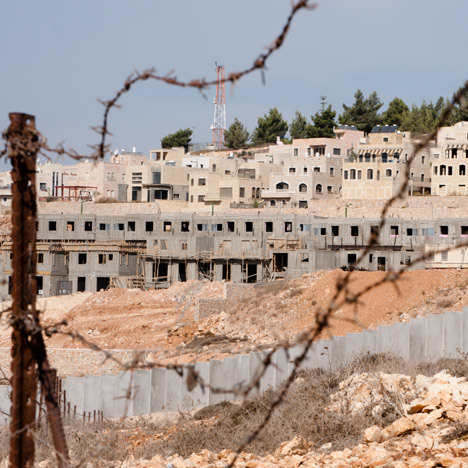News: US architects including Richard Meier and Daniel Libeskind have attacked British proposals to suspend Israeli architects from architecture's international governing body over the construction of settlements in the West Bank.
Meier and Libeskind have both expressed outrage at the stance of the Royal Institute of British Architects (RIBA), which has voted to suspend its Israeli equivalent from the Union of Architects (UIA).
"I find this incredible that the RIBA which I thought as being an extremely honourable institution would vote or agitate for sanctions against Israel," wrote Pritkzer Prize laureate Meier in a private letter to RIBA president Stephen Hodder.
"I and many other architects here in New York condemn this action and sincerely hope that it would be reversed."
New York-based architect Daniel Libeskind told the Architect's Journal: "I am disappointed to learn of this action, especially from such a well-regarded institution as the RIBA."
"This decision seems to be completely counter to the mission of the RIBA; these actions are short-sighted and appear to be an attempt to simplify a very complex issue."
Lance Brown, president of the American Institute of Architects' New York chapter, has also stepped into the escalating row, describing RIBA moves to isolate the Israeli Association of United Architects (IAUI) as "deeply troubling".
In an open letter to the RIBA, Brown wrote: "While many RIBA members (and AIA members for that matter) may not agree with Israeli policy with regards to the West Bank settlements, as they may also disagree with the actions of other countries around the world, it is completely antithetical to the spirit and intent of the UIA to expel a member organisation because of the actions of its local government."
Brown added: "If that policy had prevailed over the past decades the UIA may have no membership at all!"
The row began in March, when the RIBA's council voted to request the suspension of the IAUI from architecture's international governing body, the UIA, on the grounds that IAUI members were complicit in construction of controversial settlements.
The motion was originally proposed by former RIBA president Angela Brady, who claimed that the IAUA had paid "no regard" to a resolution condemning development and construction "on land that has been ethnically purified or illegally appropriated", projects based on "regulations that are ethnically or culturally discriminatory", and "all action contravening the fourth Geneva Convention".
Referring to activity in the disputed territory of the West Bank, which is claimed by both Israelis and Palestinians, the motion stated that the suspension should hold until the organisation "acts to resist projects on illegally-occupied land and observes international law and accords".
It passed with 23 RIBA council members voting in favour, 16 against and 10 abstaining. The motion will be put forward to the UIA at its next international congress in Durban, South Africa, this August. All 130 professional architecture bodies that form the membership of the union will be asked to vote on the proposed suspension.
Itzhak Lipovetzky, head of foreign relations at the IAUA, wrote to British prime minister David Cameron asking him to help prevent the body’s suspension.
"When the British prime minister was here [in March], he promised not to boycott Israel," said Lipovetzky.
IAUA president Baruch Baruch told The Jerusalem Post that the RIBA was being hypocritical in focusing on Israel while many of its own members worked in countries with no rights for women.
"This is a democratic and nonpolitical organization. There are members of the organisation who are working in the West Bank, and of course there are others who are not. There are a lot of opinions for and against," said Baruch.
Photograph of Israeli settlement construction is courtesy of Shutterstock.

